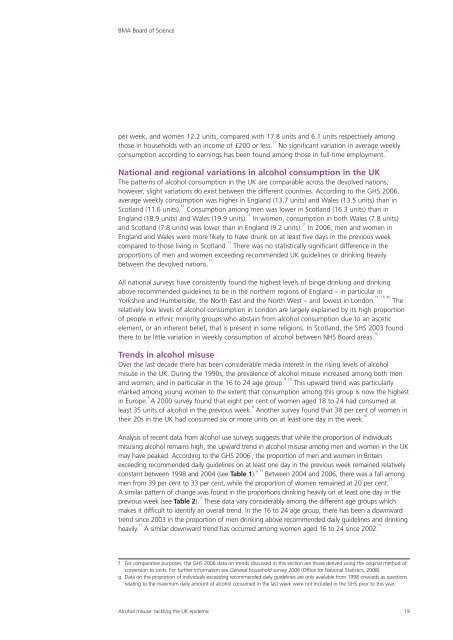Alcohol misuse: tackling the UK epidemic - London
Alcohol misuse: tackling the UK epidemic - London
Alcohol misuse: tackling the UK epidemic - London
Create successful ePaper yourself
Turn your PDF publications into a flip-book with our unique Google optimized e-Paper software.
BMA Board of Science<br />
per week, and women 12.2 units, compared with 17.8 units and 6.1 units respectively among<br />
those in households with an income of £200 or less. 11<br />
No significant variation in average weekly<br />
consumption according to earnings has been found among those in full-time employment. 11<br />
National and regional variations in alcohol consumption in <strong>the</strong> <strong>UK</strong><br />
The patterns of alcohol consumption in <strong>the</strong> <strong>UK</strong> are comparable across <strong>the</strong> devolved nations;<br />
however, slight variations do exist between <strong>the</strong> different countries. According to <strong>the</strong> GHS 2006,<br />
average weekly consumption was higher in England (13.7 units) and Wales (13.5 units) than in<br />
Scotland (11.6 units). 11<br />
Consumption among men was lower in Scotland (16.3 units) than in<br />
England (18.9 units) and Wales (19.9 units). 11<br />
In women, consumption in both Wales (7.8 units)<br />
and Scotland (7.8 units) was lower than in England (9.2 units). 11<br />
In 2006, men and women in<br />
England and Wales were more likely to have drunk on at least five days in <strong>the</strong> previous week<br />
compared to those living in Scotland. 11<br />
There was no statistically significant difference in <strong>the</strong><br />
proportions of men and women exceeding recommended <strong>UK</strong> guidelines or drinking heavily<br />
between <strong>the</strong> devolved nations. 11<br />
All national surveys have consistently found <strong>the</strong> highest levels of binge drinking and drinking<br />
above recommended guidelines to be in <strong>the</strong> nor<strong>the</strong>rn regions of England – in particular in<br />
11, 15, 40<br />
Yorkshire and Humberside, <strong>the</strong> North East and <strong>the</strong> North West – and lowest in <strong>London</strong>. The<br />
relatively low levels of alcohol consumption in <strong>London</strong> are largely explained by its high proportion<br />
of people in ethnic minority groups who abstain from alcohol consumption due to an ascetic<br />
element, or an inherent belief, that is present in some religions. In Scotland, <strong>the</strong> SHS 2003 found<br />
<strong>the</strong>re to be little variation in weekly consumption of alcohol between NHS Board areas. 12<br />
Trends in alcohol <strong>misuse</strong><br />
Over <strong>the</strong> last decade <strong>the</strong>re has been considerable media interest in <strong>the</strong> rising levels of alcohol<br />
<strong>misuse</strong> in <strong>the</strong> <strong>UK</strong>. During <strong>the</strong> 1990s, <strong>the</strong> prevalence of alcohol <strong>misuse</strong> increased among both men<br />
4, 10<br />
and women, and in particular in <strong>the</strong> 16 to 24 age group. This upward trend was particularly<br />
marked among young women to <strong>the</strong> extent that consumption among this group is now <strong>the</strong> highest<br />
in Europe. 4<br />
A 2000 survey found that eight per cent of women aged 18 to 24 had consumed at<br />
least 35 units of alcohol in <strong>the</strong> previous week. 4<br />
Ano<strong>the</strong>r survey found that 38 per cent of women in<br />
<strong>the</strong>ir 20s in <strong>the</strong> <strong>UK</strong> had consumed six or more units on at least one day in <strong>the</strong> week. 41<br />
Analysis of recent data from alcohol use surveys suggests that while <strong>the</strong> proportion of individuals<br />
misusing alcohol remains high, <strong>the</strong> upward trend in alcohol <strong>misuse</strong> among men and women in <strong>the</strong> <strong>UK</strong><br />
may have peaked. According to <strong>the</strong> GHS 2006 f<br />
, <strong>the</strong> proportion of men and women in Britain<br />
exceeding recommended daily guidelines on at least one day in <strong>the</strong> previous week remained relatively<br />
g, 11<br />
constant between 1998 and 2004 (see Table 1). Between 2004 and 2006, <strong>the</strong>re was a fall among<br />
men from 39 per cent to 33 per cent, while <strong>the</strong> proportion of women remained at 20 per cent. 11<br />
A similar pattern of change was found in <strong>the</strong> proportions drinking heavily on at least one day in <strong>the</strong><br />
previous week (see Table 2). 11<br />
These data vary considerably among <strong>the</strong> different age groups which<br />
makes it difficult to identify an overall trend. In <strong>the</strong> 16 to 24 age group, <strong>the</strong>re has been a downward<br />
trend since 2003 in <strong>the</strong> proportion of men drinking above recommended daily guidelines and drinking<br />
heavily. 11<br />
A similar downward trend has occurred among women aged 16 to 24 since 2002. 11<br />
f For comparative purposes, <strong>the</strong> GHS 2006 data on trends discussed in this section are those derived using <strong>the</strong> original method of<br />
conversion to units. For fur<strong>the</strong>r information see General household survey 2006 (Office for National Statistics, 2008).<br />
g Data on <strong>the</strong> proportion of individuals exceeding recommended daily guidelines are only available from 1998 onwards as questions<br />
relating to <strong>the</strong> maximum daily amount of alcohol consumed in <strong>the</strong> last week were not included in <strong>the</strong> GHS prior to this year.<br />
<strong>Alcohol</strong> <strong>misuse</strong>: <strong>tackling</strong> <strong>the</strong> <strong>UK</strong> <strong>epidemic</strong> 19
















